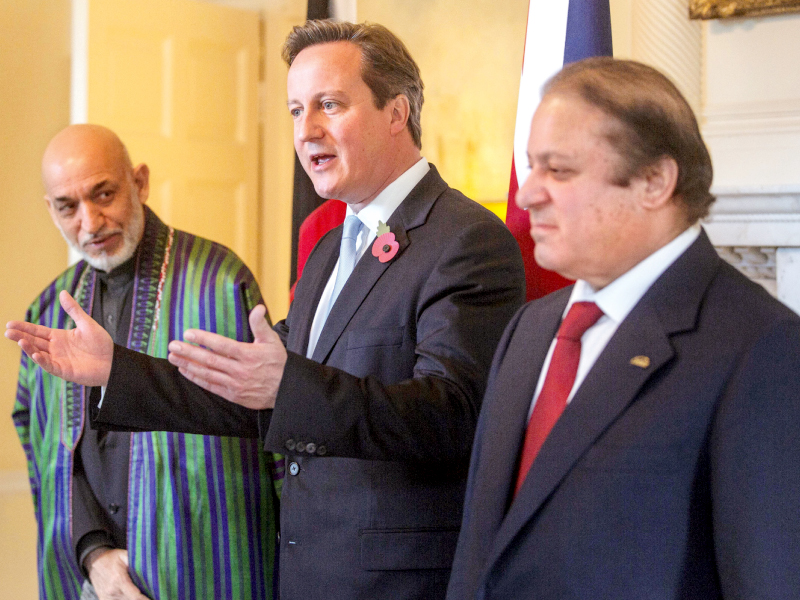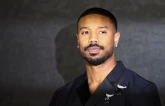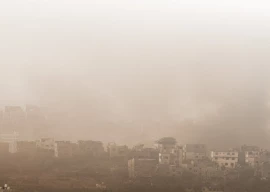
Leaders at a trilateral summit agreed on Tuesday to continue supporting the peace and reconciliation process in Afghanistan as security concerns mount ahead of the 2014 withdrawal of US-led foreign forces from the strife-torn country.
Prime Minister Nawaz Sharif, his British counterpart David Cameron and Afghan President Hamid Karzai met at 10 Downing Street following the Islamic Economic Forum, Cameron’s spokesperson said in a brief statement.
Overall, it was the fourth trilateral meeting and the first since Prime Minister Nawaz took office as a result of his party’s victory in the May 11 parliamentary elections.
According to the statement, the three leaders discussed economic cooperation and the Afghan-led peace process to which they all reaffirmed their continuing commitment. They continued their dialogue about Afghanistan and Pakistan’s shared interest in advancing regional peace, stability and prosperity.
The premier assured the Afghan and British leaders that Pakistan would not support any particular group in Afghanistan post-2014. He reiterated that Islamabad wanted an Afghan-led and Afghan-owned peace process to drag the country out of the spiral of violence.
On the domestic front, the summit was told that Islamabad wanted to have meaningful talks with homegrown militants and that all political parties have been taken on board before pursuing the dialogue option.
The trilateral meeting coincided with an explosive report in The New York Times which claimed that the United States had uncovered an Afghan attempt to gain leverage over Pakistan by cultivating an alliance with the outlawed Tehreek-e-Taliban Pakistan (TTP).
The plan was exposed when US forces raided a convoy carrying a senior TTP leader, Latif Mehsud, and captured him near Kabul.
“The disrupted plan involved Afghan intelligence trying to work with the Pakistan Taliban in order to find a trump card in a baroque regional power game that is likely to intensify after the American withdrawal next year,” the NYT said, citing US and Afghan officials.
Mistrust has strained relations between Pakistan and Afghanistan with Kabul blaming Pakistani military for supporting a resilient Taliban insurgency against the Afghan government. Islamabad, however, denies the charge.
Earlier Premier Cameron said London aims to become a top capital of Islamic finance as the city played host to the first World Islamic Forum outside the Muslim world.
“Already London is the biggest centre for Islamic finance outside the Islamic world. And today our ambition is to go further still,” Cameron told more than 1,800 political and business leaders at the ninth forum, dubbed the ‘Davos of the Muslim world’.
“I don’t just want London to be a great capital of Islamic finance in the Western world, I want London to stand alongside Dubai and Kuala Lumpur as one of the great capitals of Islamic finance anywhere in the world,” he said. “Investing in London is good for you and opening London up to your investment is good for us.”
More than 20 UK banks currently offer Islamic financial products, while 49 Islamic bonds -- called sukuks -- with a total value of $34 billion, have been listed over the last five years on the London Stock Exchange.
But Cameron aims to expand well beyond this.
Speaking at the same event, PM Nawaz said that Islamic countries, with a combined Gross Domestic Product (GDP) worth $6.6 trillion, have a lot to give to the world.
He said global wealth since 2000 had more than doubled; however, such unmatched wealth creation has been marred by “inequitable distribution of wealth across nations and even within.”
“While the developed economies have made significant gains, many countries of Asia and Africa have lagged behind and the absolute number of poor in these countries has actually increased.”
The premier explained to his audience of leaders of the Muslim world about this downside of globalisation. He blamed the national governments, international development institutions as well as the financial markets for the lack of ensuring a level playing field. “Free trade has been confined in such goods and services that have excluded labour, thereby denying opportunities available for their movement.”
Marking a policy shift by the end of the speech, Premier Nawaz spoke of trade not being a zero-sum game, adding that such an approach “will promote antagonism and destructive competition.”
Commenting on the vast natural resources possessed by Muslim countries, Nawaz said these Muslim states connect the East with the West.
Calling for global peace and ending strife in the name of religion, he said: “Religions and cultures, in fact, provide the much desired diversity to mankind,” adding, that “technological and scientific advancement should serve as tools for human development rather than conflict and destruction.”
Published in The Express Tribune, October 30th, 2013.
COMMENTS (3)
Comments are moderated and generally will be posted if they are on-topic and not abusive.
For more information, please see our Comments FAQ







1734846750-0/Untitled-design-(96)1734846750-0-270x192.webp)















@Khan The body language of NS tells the mood of indifference because Shabaz Sharif is not with him in this meeting.
Ahhh.......The body language is precious. Nawaz is looking sheepish and guilty, while Karzai looks at him mischievously, enjoying the moment.
The report from the NYT maybe explosive to deluded liberals who are always defending Afghanistan and India, it was common knowledge for most Pakistanis.